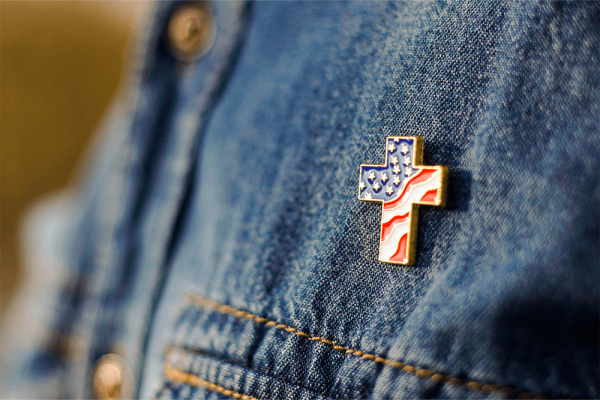Two seemingly contradictory things are happening within the Religious Right: More politicians and evangelical leaders are using blatant Christian nationalist rhetoric; meanwhile, others within the movement are falsely claiming that Christian nationalism is somehow an invention of academia and the Left intended to muzzle the voice of Bible-believing Christians.
For example, in an April campaign event, Doug Mastriano, the Republican nominee for governor in Pennsylvania, referred to the “myth of the separation of church and state” while giving a speech at a conference that advertised with slogans like “Arise Patriots for God and Country … Taking back what is rightfully ours!” In July, Georgia’s Republican Rep. Marjorie Taylor Greene went further saying, “We need to be the party of nationalism and I’m a Christian, and I say it proudly, we should be Christian nationalists.”
But this week, at an event hosted by the Family Research Council, speakers cited critiques of Christian nationalism as proof that politicians on the Left are trying to persecute the Christian faith. “They’re trying to make those of us who believe in biblical values the extremists,” said former member of Congress Michelle Bachman at the event, after showing the audience a clip of President Joe Biden disavowing Christian nationalism.
I want to be clear about two things. First, I strongly oppose Christian nationalism because of my profound love for the witness and integrity of the church and because of my deep belief in the gospel. Second, as Christians, we need to keep denouncing the most blatant examples of Christian nationalism from politicians, faith leaders, and groups like the Proud Boys and Oath Keepers who participated in the Jan. 6 insurrection.
Yet if we care about the integrity of the Christian faith, there is a more difficult — but equally important — challenge beyond these denunciations. We also need to address the subtle but insidious versions of Christian nationalism that so often seep into our churches. It’s easy to denounce Christian nationalism when someone like Greene prints it proudly on a t-shirt, but how do we respond to those who feel as though their Christian values are unwelcome or under attack in an increasingly secular society? As public historian Jemar Tisby emphasized in a webinar organized by Faithful America, Christian nationalism exists on a continuum; while it’s right to be alarmed that the folks on the more extreme end are growing louder, we also can’t ignore the quieter forms.
Nearly 20 years ago, religion scholar Richard T. Hughes argued that two related myths —America is both a Christian nation and a chosen nation — were woven into the DNA of the U.S. Starting with the Puritans and other white settlers, these myths were often used to sanctify the genocide of the Native Americans and later to justify the heinous system of slavery.
Today, these myths are still firmly entrenched: According to a 2020 survey from the Public Religion Research Institute, 36 percent of Americans agree the U.S. is and has always been a Christian nation. The same survey asked respondents if God has granted America a special role in human history and 40 percent agreed.
It is easy to feel powerless in the face of these statistics, but a belief in the possibility of conversion is at the heart of Christian faith; God can change even the most hardened hearts and minds.
To repudiate the false gospel of Christian nationalism, I believe we need to do three things: First, we need to better understand both the overt and covert versions of Christian nationalism and how they show up in our churches and public discourse. Second, we must demonstrate greater courage to denounce the more extreme forms, especially those that resort to violence, as a religious heresy and direct threat to our democracy. Finally, we must invite those who are swayed and seduced by Christian nationalism to instead join a commitment to build the reign of God, which transcends nation-states, seeks to build shalom, and shows radically inclusive love to everyone.
Defining Christian nationalism
There are many people who have helped me understand the nature and threat of Christian nationalism, including journalist Katherine Stewart; religious studies professor Anthea Butler; and historian Kristin Kobes Du Mez. I’ve been equally influenced by the work that Amanda Tyler and her collaborators at the Baptist Joint Committee on Religious Liberty (BJC) have done through the Christians Against Christian Nationalism campaign.
When talking about Christian nationalism, it’s important to be precise in our definitions; just because someone votes conservative, identifies as pro-life, or believes marriage should only be between a man and a woman, we shouldn’t assume they are also Christian nationalists. Sociologists Samuel L. Perry and Phillip Gorski, co-authors of The Flag and the Cross, offered a helpful definition in a recent interview with Sojourners: Christian nationalism, they say, is “a constellation of beliefs — that the founding of the United States was ‘divinely inspired’ or that God is invested in the success of the U.S. — that manifest in political goals.”
Like all seductive myths, these ideas contain partial truths: Yes, many of the founders of the U.S. were indeed Christians (though many of them, like Thomas Jefferson, rejected the resurrection and other central parts of Christian belief). And yes, some of the ideas in the Constitution, such as the separation of powers, were shaped by Christian teachings on the nature of human sinfulness. Yet these myths conveniently overlook how the founders explicitly rejected establishing Christianity as a national religion and enshrined a firm commitment to the free exercise of religion through the First Amendment.
These myths — America is a Christian nation, America is a chosen nation — in turn, create on-ramps into more overt forms of Christian nationalism. Perry and Gorski found that when Christian nationalism fuses with white racial identity, it results in “the use of ‘us versus them’ language to make a claim about a country that once was ‘ours,’ that ‘we’re trying to take back,’ that ‘rightfully belongs to people like us.’”
This kind of white Christian nationalist logic leads many of our siblings in Christ to pine for a version of our nation’s past that is out of step with the reality of religious pluralism that existed within our history and our increasingly pluralistic future. And as we saw in Charlottesville in 2017 and the U.S. Capitol in 2021, white Christian nationalism can be especially effective in motivating acts of radical violence.
Christian nationalism is heresy
As we work to denounce all forms of Christian nationalism as a heresy, we must turn to Jesus’ example. Through his teachings and actions, Jesus rejected both nationalism as well as imperialism and instead chose the path of service, particularly to the outcast and marginalized, offering himself as a sacrifice to save and liberate us. While on trial for the crime of sedition, Jesus tells Pontius Pilate, “My kingdom is not of this world (John 18:36).”
Christian nationalists seem intent on remaking America into a Christian theocracy. But that’s not what God asks us to do. Instead, we are called to be salt and light and try to model and promote Jesus’ values and priorities — priorities which always begin with a commitment to be good news to the poor (Luke 4) and the countercultural beatitudes that Jesus preaches in the Sermon on the Mount (Matthew 5). Christian nationalism, on the other hand, is often fueled by what theologian Howard Thurman called the three hounds of hell that track the disinherited: fear, hatred, and hypocrisy.
The “us-versus them,” zero-sum mentality that Christian nationalism often promulgates runs counter to the radical inclusion and love ethic that Jesus modeled throughout his public ministry. Claiming that the U.S. is divinely favored by God is a dangerous misuse of scripture that often leads us down the path of arrogance and triumphalism rather than humility and faithfulness. We must constantly remind ourselves and others that the Apostle Paul emphasized “there is neither Jew nor Greek, there is neither bond nor free, there is neither male nor female: for we are all one in Christ Jesus” (Galatians 3:28), which means that God’s love and human dignity are universal and know no national or racial boundaries. When Christians distort this message of inclusive love into a false message of God’s unique favor for a particular nation, racial group, or political party, it discredits the Christian cause and alienates many of the same people the church is trying so hard to reach.
An invitation to deeper discipleship
As we denounce Christian nationalism, we must also be honest that most of us have been —consciously and unconsciously — influenced by its insidious myths. This recognition can help us find greater empathy to disciple those who may be tempted by Christian nationalist beliefs. Whitehead and Perry’s research found that Christians who regularly attend religious services and are religiously active are less prone to hold racist and sexist views than Christians who are similarly disposed towards Christian nationalism but only attend church more rarely. This points to the positive discipling influence that genuine fellowship and community can provide — and a charge to all of us to disciple people out of Christian nationalism and into a radical commitment to the kingdom of God, which is characterized by inclusive love and protecting human dignity.
In more universal language, that commitment mirrors the moral vision that animated the civil rights movement, the vision of the Beloved Community. As I write in A More Perfect Union, this includes commitments to imago dei equality, radical welcome, ubuntu interdependence, nonviolence, environmental stewardship, and dignity for all. Resources like Sojourners’ Divided Congregations curriculum, is one way to help build bridges of understanding between Christians of different political convictions while also discipling people away from the heresy of Christian nationalism. Christians Against Christian Nationalism has also developed a series of practical resources.
At its best, the church should serve as a bridge between people of faith who are coming from different perspectives and a space where different viewpoints can even coexist. The Religious Right often acts as though they have a monopoly on how biblical values are defined and lived out, but this ignores the Christians who have a much more expansive list of biblical values — from fighting poverty, combatting climate change, promoting gender equality, to dismantling systemic racism, and more.
Now is the moment to show greater courage in denouncing the extreme perversions of Christian faith even as we demonstrate empathy to siblings in Christ who have internalized Christian nationalist beliefs, including in their more subtle forms. The threat of Christian nationalism is real and the solution is greater public courage, better dialogue, and deeper discipleship in how we can apply our faith to the messiness of politics.
Editor's note: An earlier version of this article listed the wrong year for the Unite the Right rally in Charlottesville, Va., which occured in 2017, not 2015.
Got something to say about what you're reading? We value your feedback!







